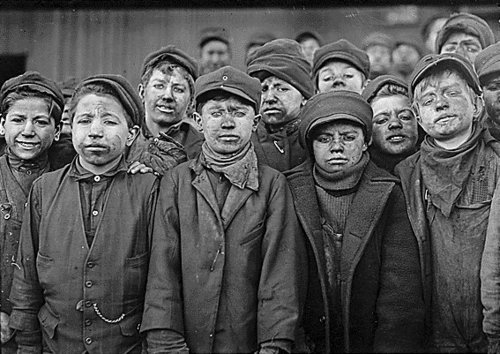transformation 1

“For the love of money is the root of all evil: which while some coveted after, they have erred from the faith, and pierced themselves through with many sorrows.” I Timothy 6:10 KJV
What we once held as sacred – water, air, trees, children, animals, etc., we have now turned into commodities for profit. At some point in our history we were aware that the Earth did not need us to survive but we needed the Earth to survive. However, with the advent of the Industrial Revolution a new creed of utter materialism emerged. According to Karl Polanyi in his book The Great Transformation: the political and economic origins of our time, with this revolution came the belief, “that all human problems could be resolved given an unlimited amount of material commodities.” (p. 40) With the Industrial Revolution came a demand for laborers. Products that were once made uniquely by hand and traded were now made uniform in factories and sold in mass. The machines did not require a lot of strength to operate so children were used for labor. Polanyi discusses the classical economist concepts of the “bartering savage” (p. 44) and the “abandonment of all interest in the cultures of ‘uncivilized’ man as irrelevant to an understanding of the problems of our age.” He also explores a variety of theories that try to answer the question, “Where do the poor come from?” (p. 90)
Observing our modern world, it seems we are still reveling in the wake of the Industrial Revolution, except many of the factories of workers have moved to China and other countries outside of Europe and the United States. Our consumer society demands goods and in fact there are those who believe that we can buy our way to a good economy. We still see water, land, air, and sometimes even children as commodities, and so we have even had to put laws in place that work to protect our environment and children. We have forgotten how the “uncivilized man” was able to live sustainably on this Earth for thousands of years without destroying it while today we have “dead zones” in our waterways due to the dumping of harsh chemicals and pollution. Our streams are poisoned and so we can no longer drink from them but instead must create factories where we make plastic bottles to hold “clean” filtered water. It seems somehow somewhere something went wrong. And now we must figure out how to get ourselves out of this mess before our planet becomes a waste dump of no-longer-desired technology, toys, and non-biodegradable “goods.” On the other hand, the use of technology has helped slow the need for trees to be used as paper, and there are a lot of great efforts that are focused on creating products that are sustainable. So, perhaps we are waking up and realizing that we must make a “great transformation” in our thinking.
Could our society survive again in small self-sustaining groups? Has population increases demanded that our current way of living is necessary for survival? How long will we be able to continue living at our current standard without destroying our natural sources of survival? Are we willing to make sacrifices in the way we live for future generations? What spiritual and theological ideas have spurred the materialism? How have these ideas affected our “uncivilized” indigenous brothers and sisters?
Polanyi, Karl. The Great Transformation: The Political and Economic Origins of Our Time, Boston, MA: Beacon Press, 1965.
Photography by Lewis Hine
Leave a Reply
You must be logged in to post a comment.